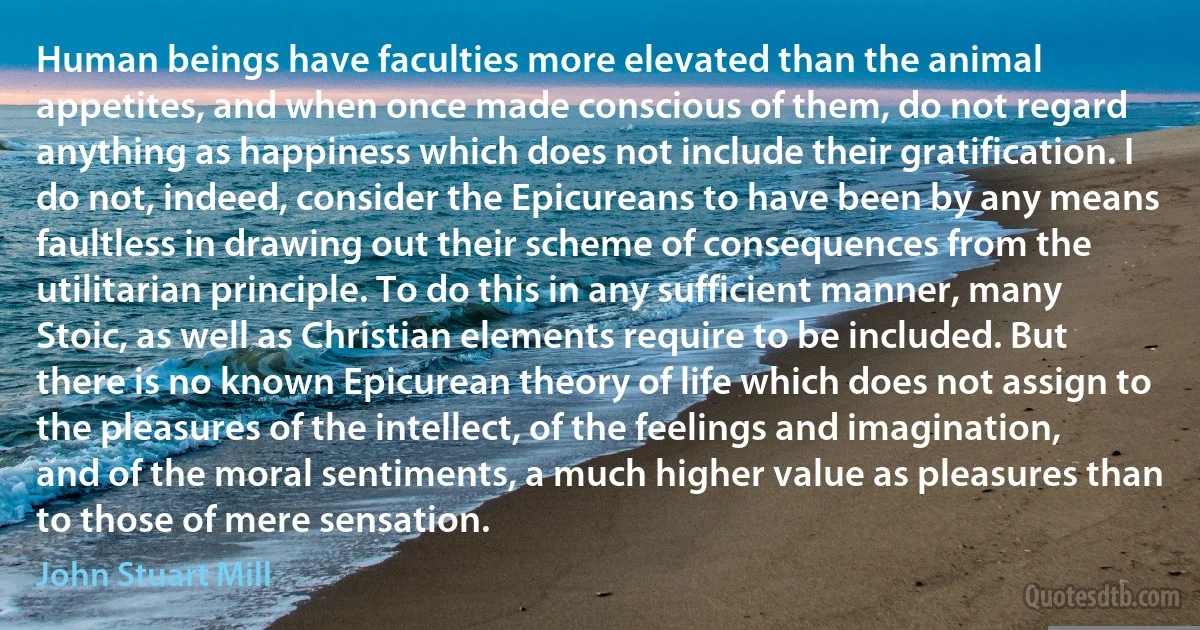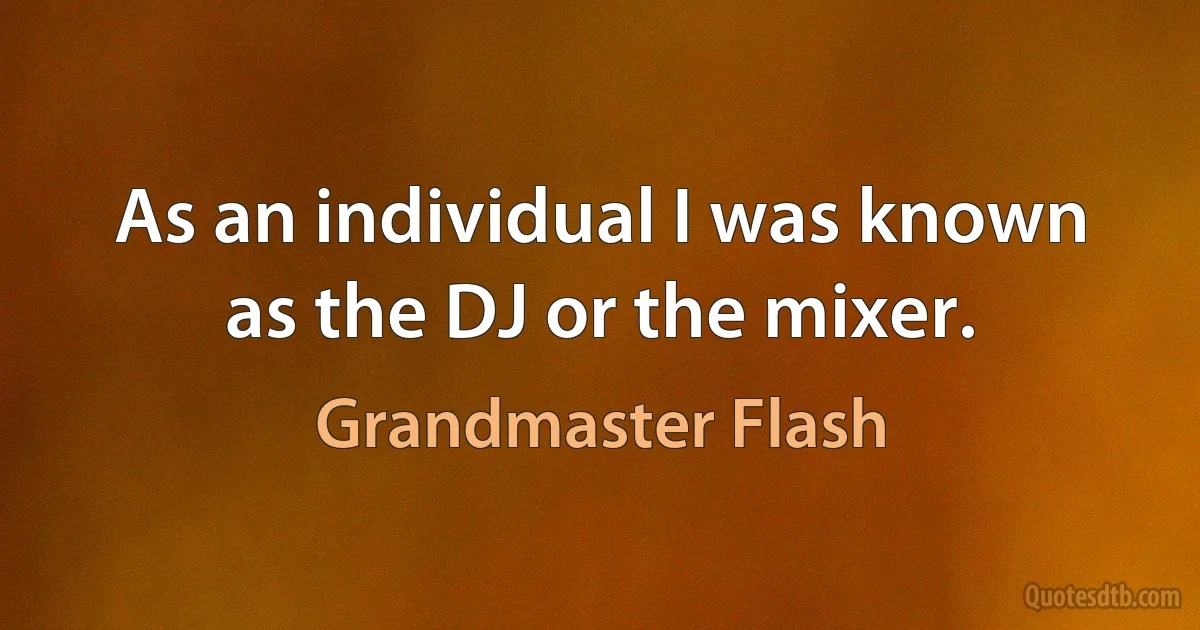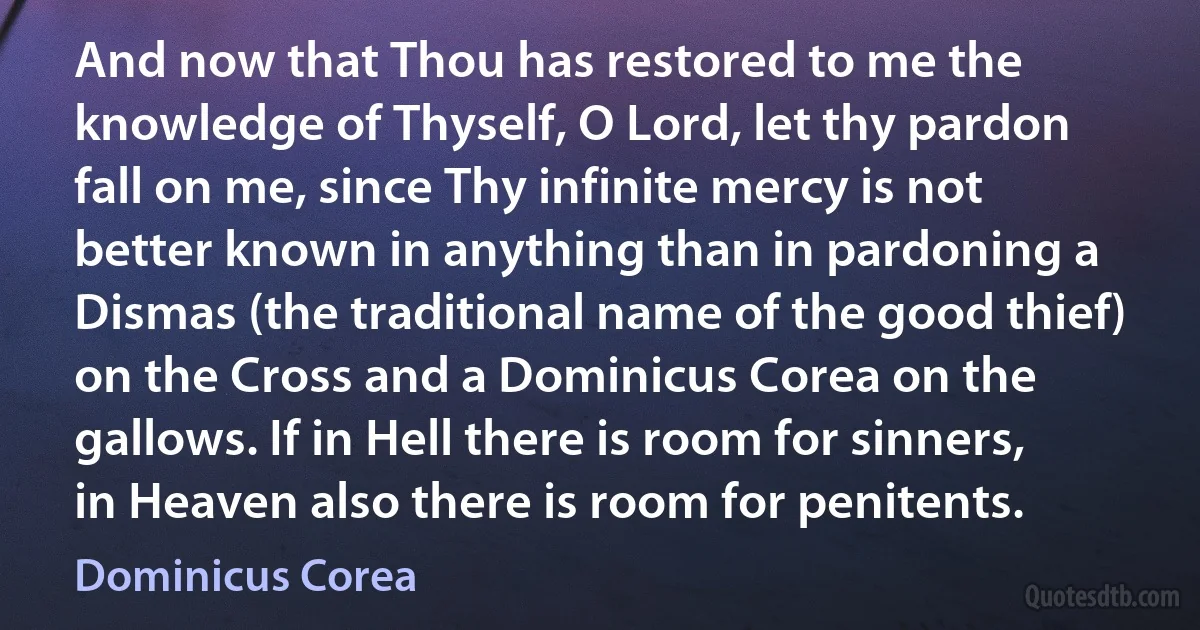Known Quotes - page 76
The notion that truths external to the mind may be known by intuition or consciousness, independently of observation and experience, is, I am persuaded, in these times, the great intellectual support of false doctrines and bad institutions. By the aid of this theory, every inveterate belief and every intense feeling, of which the origin is not remembered, is enabled to dispense with the obligation of justifying itself by reason, and is erected into its own all-sufficient voucher and justification. There never was such an instrument devised for consecrating all deep-seated prejudices.

John Stuart Mill
I soon perceived that she possessed in combination, the qualities which in all other persons whom I had known I had been only too happy to find singly. In her, complete emancipation from every kind of superstition (including that which attributes a pretended perfection to the order of nature and the universe), and an earnest protest against many things which are still part of the established constitution of society, resulted not from the hard intellect, but from strength of noble and elevated feeling, and co-existed with a highly reverential nature.

John Stuart Mill
Marijuana is the finest anti-nausea medication known to science, and our leaders have lied about this consistently. Arresting people for medical marijuana is the most hideous example of government interference in the private lives of individuals. It's an outrage within an outrage within an outrage.

Peter McWilliams
His [Sarpi's] career soon revealed another cause of his return; he evidently felt the same impulse which stirred his contemporaries, Lord Bacon and Galileo, for he began devoting himself to the whole range of scientific and philosophical studies, especially to mathematics, physics, astronomy, anatomy, and physiology. In these he became known as an authority, and before long was recognized as such throughout Europe. It is claimed, and it is not improbable, that he anticipated Harvey in discovering the circulation of the blood, and that he was the forerunner of noted discoverers in magnetism. Unfortunately the loss of the great mass of his papers by the fire which destroyed his convent in 1769 forbids any full estimate of his work; but it is certain that among those who sought his opinion and advice were such great discoverers as Acquapendente, Galileo, Torricelli, and Gilbert of Colchester, and that every one of these referred to him as an equal, and indeed as a master.

Andrew Dickson White
I was... told by a person who had known him [future Emperor Nicholas II] intimately from his childhood, that, though courteous, his main characteristic was an absolute indifference to most persons and things about him, and that he never showed a spark of ambition of any sort. This was confirmed by what I afterward saw of him at court. He seemed to stand about listlessly, speaking in a good-natured way to this or that person when it was easier than not to do so; but on the whole, indifferent to all which went on about him. After his accession to the throne, one of the best judges in Europe, who had many opportunities to observe him closely, said to me, "He knows nothing of his empire or of his people; he never goes out of his house, if he can help it." This explains in some degree the insufficiency of his program for the Peace Conference at The Hague and for the Japanese War, which, as I revise these lines, is bringing fearful disaster and disgrace upon Russia.

Andrew Dickson White
Yes, the investor is often his own worst enemy. Yes, the marketing colossus known as the mutual fund industry provides the weaponry which enables investors to indulge their suicidal instincts. No, the fund industry was hardly an innocent bystander in the market boom and the subsequent carnage. "We have met the enemy and he is us"... all of us.

John Bogle
My father, William C. Boulding, was a working plumber in business for himself. At the back of the house was the yard, a corrugated iron shed full of pipes, wrenches, and blow torches, and other mysterious and rather frightening apparatus. He had two faithful employees, Billy Fox, who was moody and regarded as a little queer, and Billy Sankey, who was short and cheerful. They and my father always smelled strongly of some kind of grease. My father was a gentle man. I never I never heard his voice raised in anger. He had had a very hard childhood. His father died soon after he was born; his mother married again, a man known in the family legends as "Pa Hardacre," about whom endless stories were told. He was a bigamist. He drove my father out of the house at the age of twelve to earn his own living on the streets of Liverpool. He constantly mistreated my half-aunts, Ethel and Rosie. He died before I was born, but my mother's accounts of him sounded like something out of Dickens.

Kenneth Boulding
This little Collection differs, it is believed, from others in the attempt made to include in it all the best original lyrical pieces and songs in our language, by writers not living, and none besides the best. The Editor will regard as his fittest readers those who love poetry so well, that he can offer them nothing not already known and valued.

Francis Turner Palgrave
"Citizens must feel that their obedience or disobedience is not a private but a public fact in the interest of everyone and that it must be made widely known.
The freedom of association and expression is the first duty/right of every citizen, because it is the way to learn and to teach.

Aldo Capitini
Contemporary liberals think of rights as universal human attributes that can be respected anywhere, but here they show a characteristic disregard of history. Current understandings of human rights developed along with the modern nation-state. It was the nation-state that emancipated individuals from the communal ties of medieval times and created freedom as it has come to be known in the modern world. This was not done without enormous conflict and severe costs. Large-scale violence was an integral feature of the process. If the US became a modern nation only after a civil war, France did so only after the Napoleonic wars and Germany after two world wars and the Cold War. In Africa and the Balkans the struggle for nationhood has run in parallel with ethnic cleansing, while the welding of China into a nation that is underway today involves the suppression of Muslim minorities and something not far from genocide in Tibet.

John N. Gray
From a Darwinian point of view, human beliefs are adaptations to our part of the world. No doubt much of what we believe must be roughly accurate, or else we would not have survived. But the beliefs we have evolved might latch on to the world only enough to help us stumble our way through it, and then only for the time being. Human belief-systems could be useful illusions, appearing and disappearing as they prove to be more or less advantageous in the random walk of natural selection. Might not evolution be one of these illusions? Scientific naturalism is the theory that human beliefs are evolutionary adaptations whose survival has nothing to do with their truth. But in that case scientific naturalism is self-defeating, since on its own premises scientific theories cannot be known to be true.

John N. Gray
Some of the very heroic and colourful figures in our history are sons of Sabaragamuwa - Parakramabahu I, born in Dedigama, the warrior King Rajasinghe I also known as Sitawaka Rajasingha, Edirille Rala born in Colombo and baptised Domingo Corea, who returned to the village of his ancestors Atulugama near Sitawaka and turned against the Portuguese.

Dominicus Corea
The theory of the origin of new species by variation will also explain why a species which has once died out never reappears, and why the fossil fauna and flora recede farther and farther from the living type in proportion as we trace it back to remoter ages. It would also account for the fact, that when we have to intercalate a new set of fossiliferous strata between two groups previously known, the newly discovered fossils serve to fill up gaps between specific or generic types previously familiar to us, supplying often the missing links of the chain, which, if transmutation is accepted, must once have been continuous.

Charles Lyell



